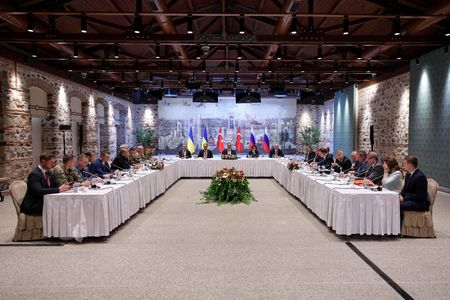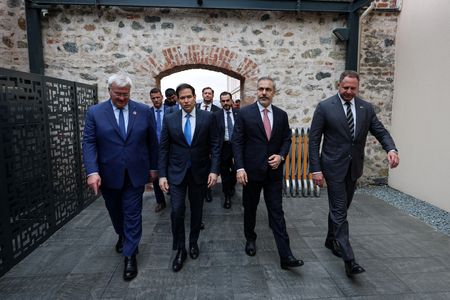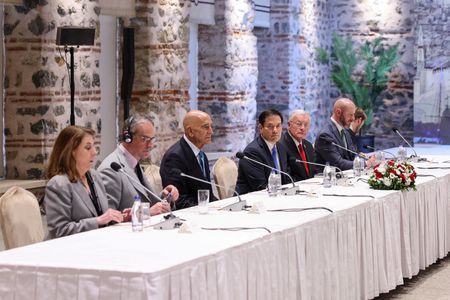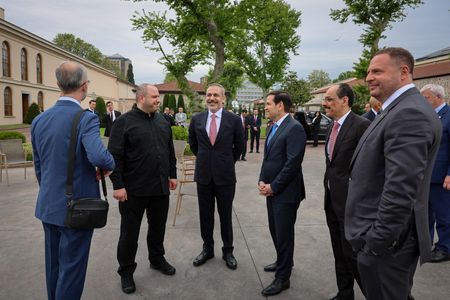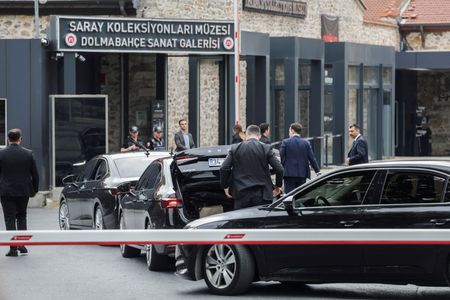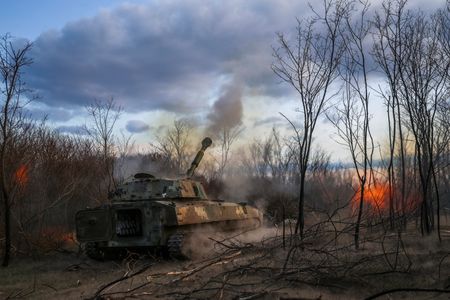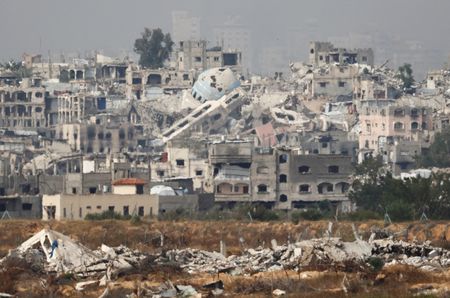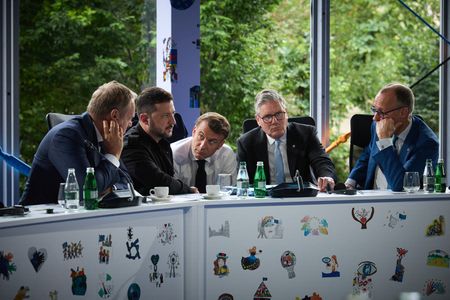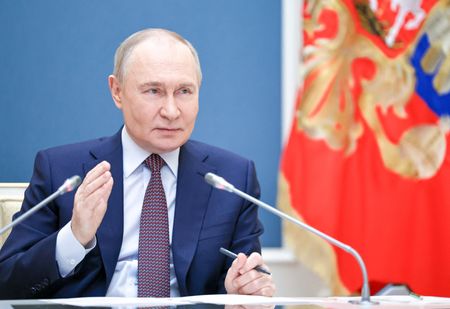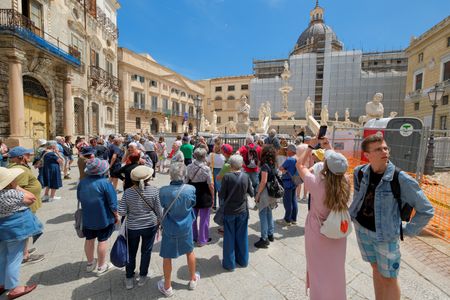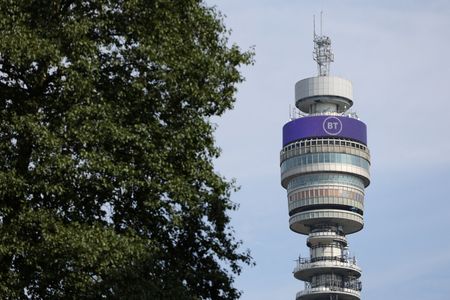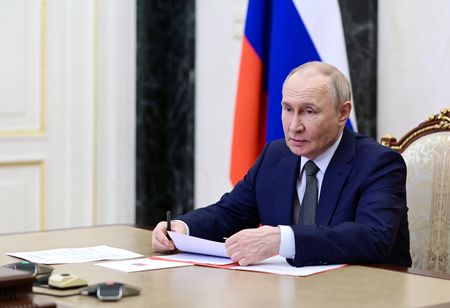By Tom Balmforth, Can Sezer and Vladimir Soldatkin
ISTANBUL (Reuters) -Ukraine rallied support from its Western allies on Friday after Kyiv and Moscow failed to agree to a ceasefire at their first direct talks in more than three years, with Russia presenting conditions that a Ukrainian source described as “non-starters”.
Under pressure from U.S. President Donald Trump to end the bloodiest conflict in Europe since World War Two, delegates from the warring countries met for the first time since March 2022, the month after Russia invaded its neighbour.
The talks in an Istanbul palace lasted less than two hours. Russia expressed satisfaction with the meeting and said it was ready to continue contacts. Both countries said they had agreed to trade 1,000 prisoners of war each soon in what would be the biggest such exchange yet.
But Kyiv, which wants the West to impose tighter sanctions on Moscow unless President Vladimir Putin accepts a proposal from Trump for a 30-day ceasefire, immediately began rallying its allies for tougher action.
As soon as the talks ended, Ukraine’s President Volodymyr Zelenskiy said on X that he had spoken by phone with Trump and the leaders of France, Germany and Poland.
“Ukraine is ready to take the fastest possible steps to bring real peace, and it is important that the world holds a strong stance,” Zelenskiy said. He called for “tough sanctions” if Russia rejects a full and unconditional ceasefire.
Russia – which is slowly but steadily advancing on the battlefield and is worried that Ukraine will use such a pause to regroup and re-arm – has said it needs to nail down the terms of a ceasefire before signing up to one.
“We have agreed that each side will present its vision of a possible future ceasefire and spell it out in detail,” Russia’s lead negotiator, Vladimir Medinsky, told reporters after the meeting. “After such a vision has been presented, we believe it would be appropriate, as also agreed, to continue our negotiations.”
CALM ATMOSPHERE
At the meeting convened by Turkey, the negotiating teams sat opposite one another at a U-shaped table, with the Russians dressed in suits while half of the Ukrainians wore military fatigues.
The atmosphere was calm, a Turkish official said. No concrete timetable or location was agreed for the next talks, the official said, with both sides needing to debrief their leaders first.
The Ukrainians spoke in their own language through an interpreter, a Ukrainian source said, although Russian is widely spoken in Ukraine.
A Ukrainian and a European source said Russia rejected a Ukrainian request for U.S. representatives to be in the room.
Two sources familiar with the talks said Medinsky said Russia was ready to keep fighting for as long as necessary, drawing a parallel with the wars of Tsar Peter the Great against Sweden, which lasted 21 years in the early 1700s.
“We do not want war, but we are ready to fight for a year, two, three — as long as you want,” one of the sources quoted him as saying.
“DETACHED FROM REALITY”
A Ukrainian delegation source said Russia’s demands in the meeting were “detached from reality and go far beyond anything that was previously discussed”.
The source, speaking on condition of anonymity, said Moscow had issued ultimatums for Ukraine to withdraw from parts of its own territory in order to obtain a ceasefire, “and other non-starters and non-constructive conditions”.
British Prime Minister Keir Starmer said the Russian position was “clearly unacceptable” and that European leaders, Ukraine and the U.S. were “closely aligning” their responses.
European Commission President Ursula von der Leyen said the EU was working on a new package of sanctions against Moscow.
Russia has said it sees its talks with Ukraine as a continuation of the 2022 negotiations, also held in Istanbul. But the terms under discussion then, when Ukraine was still reeling from Russia’s invasion, would be deeply disadvantageous to Kyiv now.
They included a demand by Moscow for large cuts to Ukraine’s military. With Russian forces in control of about a fifth of Ukraine, Putin has also insisted Kyiv cede territory, abandon NATO membership ambitions and become a neutral country.
Ukraine rejects these terms as tantamount to capitulation, and is seeking guarantees of its future security from world powers, especially the United States.
Crediting efforts by Trump and other U.S. officials, Putin’s investment envoy, Kirill Dmitriev, posted on X that Friday’s talks produced “good results… 1. Largest POW exchange, 2. Ceasefire options that may work 3. Understanding of positions and continued dialogue”.
NEXT STEP UNCLEAR
Putin, after proposing the direct talks in Turkey, spurned a challenge from Zelenskiy to meet him personally in Istanbul, denting expectations for a major breakthrough.
Hopes receded further on Thursday when Trump, winding up a Middle East tour, said there would be no movement until he and Putin met.
The Kremlin said on Friday a Putin-Trump meeting was essential to make progress but would need considerable preparation and would have to yield results.
Trump, in an interview with Fox News that aired on Friday, said he thought he would make “a deal” with Putin but that he would impose sanctions on Russia if “we’re not going to make a deal.”
Ukraine and Russia agreed “in principle” on Friday to meet again, Turkey’s foreign minister, Hakan Fidan, wrote on X.
The Ukrainian delegation leader, Defence Minister Umerov, said the next step should be a meeting at the leaders’ level.
Medinsky told reporters his team had “taken note” of the Ukrainian request for direct talks between Zelenskiy and Putin.
(Reporting by Can Sezer, Humeyra Pamuk, Tom Balmforth, Vladimir Soldatkin and Jonathan Spicer in Istanbul, Olena Harmash, Yuliia Dysa and Oleksandr Kozhukar in Kyiv, Ece Toksabay and Tuvan Gumrukcu in Ankara, John Irish in Paris, Andrew Gray and Fatos Bytyci in Tirana, Ron Popeski in Winnipeg, Lidia Kelly in Melbourne and Reuters reporters in Moscow; Writing by Mark Trevelyan; Editing by Peter Graff, Alex Richardson, Frances Kerry and Cynthia Osterman)


